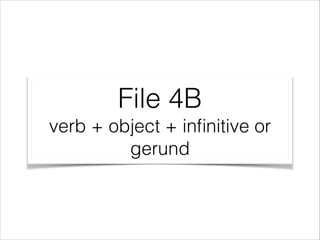Grammar: infinitive + object + infinitive /gerund
•
4 j'aime•4,244 vues
Signaler
Partager
Signaler
Partager
Télécharger pour lire hors ligne

Recommandé
Recommandé
Contenu connexe
Tendances
Tendances (20)
Used to, get used to be used to and would slideshare 

Used to, get used to be used to and would slideshare
En vedette
En vedette (15)
Foundations of Grammar 21: What are comparatives and superlatives?

Foundations of Grammar 21: What are comparatives and superlatives?
Foundations of Grammar 9: What is an indirect object?

Foundations of Grammar 9: What is an indirect object?
Similaire à Grammar: infinitive + object + infinitive /gerund
Similaire à Grammar: infinitive + object + infinitive /gerund (20)
Dernier
APM Welcome
Tuesday 30 April 2024
APM North West Network Conference, Synergies Across Sectors
Presented by:
Professor Adam Boddison OBE, Chief Executive Officer, APM
Conference overview:
https://www.apm.org.uk/community/apm-north-west-branch-conference/
Content description:
APM welcome from CEO
The main conference objective was to promote the Project Management profession with interaction between project practitioners, APM Corporate members, current project management students, academia and all who have an interest in projects.APM Welcome, APM North West Network Conference, Synergies Across Sectors

APM Welcome, APM North West Network Conference, Synergies Across SectorsAssociation for Project Management
Dernier (20)
Web & Social Media Analytics Previous Year Question Paper.pdf

Web & Social Media Analytics Previous Year Question Paper.pdf
Russian Escort Service in Delhi 11k Hotel Foreigner Russian Call Girls in Delhi

Russian Escort Service in Delhi 11k Hotel Foreigner Russian Call Girls in Delhi
social pharmacy d-pharm 1st year by Pragati K. Mahajan

social pharmacy d-pharm 1st year by Pragati K. Mahajan
APM Welcome, APM North West Network Conference, Synergies Across Sectors

APM Welcome, APM North West Network Conference, Synergies Across Sectors
IGNOU MSCCFT and PGDCFT Exam Question Pattern: MCFT003 Counselling and Family...

IGNOU MSCCFT and PGDCFT Exam Question Pattern: MCFT003 Counselling and Family...
Call Girls in Dwarka Mor Delhi Contact Us 9654467111

Call Girls in Dwarka Mor Delhi Contact Us 9654467111
Z Score,T Score, Percential Rank and Box Plot Graph

Z Score,T Score, Percential Rank and Box Plot Graph
Grammar: infinitive + object + infinitive /gerund
- 1. File 4B verb + object + infinitive or gerund
- 2. verbs + object + to + infinitive! ask, advise, allow, beg, cause, enable, encourage, expect, force, help, intend, invite, mean, order, persuade, recommend, remind, take (time), teach, tell, warn. We expect the flight to arrive at 19.50. It took me ages to get there. She advised him not to travel by train
- 3. After advise, persuade, remind, teach, tell, and warn you can also use an object + that clause. He advised me that I should stay off work for two weeks.
- 4. ! After recommend you can use:! - object + to + infinitive: He recommended me to take some cash. - a that clause: He recommended that I took some cash. You can’t use recommend + object + that clause, e.g. NOT He recommended me that I took some cash.
- 5. We also often use object + infinitive with want, would like, would love, would prefer, would hate. I would hate you to think that I don’t appreciate your offer of help. I’d like you to send me the bill. After these verbs a that clause is impossible. NOT I would hate that you think
- 6. After some verbs including arrange, ask, plan, and wait we put for immediately after the verb before the object + to + infinitive. I’m waiting for my friend to arrive. We’ve arranged for a taxi to come at 6.30.
- 7. verb + object + infinitive without to! after let, make, and help. Please let me explain! He made me feel really guilty. Can you help me do the washing up? Help can be followed by object + infinitive with or without to, e.g. She helped me (to) make the dinner.
- 8. ! When make sb do sth is used in the passive, it is followed by the infinitive with to: We were made to clean our rooms every morning
- 9. verb + object + gerund Please don’t keep me waiting! I dislike people telling me what to do. I don’t mind you smoking in the garden, but please don’t smoke in the house. The verbs stop and prevent are often followed by object + from + gerund He tried to prevent his wife from finding out the truth about his past.
- 10. After suggest you can use:! - suggest + gerund: He suggested taking a taxi. - suggest + a that clause - + subjunctive: They suggested that he take a taxi - + should + infinitive without to: They suggested that he should take a taxi. - + a present / past tense: They suggested that he took a taxi.
- 11. ! After suggest you can’t use:! suggest + object + that clause, e.g. NOT He suggested me to take a taxi.
